| Author |
|
Stephen Robinson
Byrne Robotics Member

Joined: 16 April 2004
Location: United States
Posts: 5833
|
| Posted: 12 December 2007 at 5:49pm | IP Logged | 1
|
|
|
If you truly believe that most people care more about the WWII or the Holocaust than 9/11, you're mistaken. Most High School and College students couldn't identify who fought in WWII or the dates the war started and ended. For these same people to have opinion on it, they would have to be aware of it. But an overwhelming majority of those same people would have an opinion on 9/11. Why is this such a difficult concept to understand?
****
SER: I won't belabor this but I think you're arguing semantics. Yes, I would concede that most Americans would not know the specifics or even some of the general concepts of WWII. However, the Holocaust itself is a hot-button issue. In fact, more accurate would be to compare 9/11 to Pearl Harbor rather than to WWII as a whole.
Anyway, as another poster said, you are arguing moral relativism where none exists in comics. Magneto is a objectively a bad guy. There is no other way of interpreting his actions.
|
| Back to Top |
profile
| search
| www
|
| |
Sean Blythe
Byrne Robotics Member

Joined: 13 July 2006
Location: United States
Posts: 342
|
| Posted: 12 December 2007 at 6:09pm | IP Logged | 2
|
|
|
I'm going to chime in here for a moment in support of Scott's point(s).
I think when he asked for 9/11 to be left out of the discussion, he did so
for the reason that that day still can't be discussed rationally -- that it's
all just too fresh in our minds, and any suggestion that those terrorists
had a reason to do what they did... well, you see the minefield that line of
thinking is bound to become.
The thing about this argument that strikes me as more than a bit absurd
is comparing fictional actions to real-world ones -- even when said
fiction uses real-world events to propel its stories. Magneto's "Holocaust
experience" will never be as raw or painful to anyone as an account of
someone who went through that horror, because Magneto never really
went through anything. He's a character in an ongoing work of fiction,
and his Holocaust is a plot device and, in some ways, a parable.
I guess what I'm saying is: no, the use of the Holocaust as character
motivation in a comic book is not as emotional as a real-world event,
especially one that happened six years ago and that we all remember
vividly. The layer that Claremont added to that character was meant to
draw a comparison, to add a layer of motivational (and even political)
complexity what tends to be an awfully black and white genre. I think his
execution was a little heavy handed in places, but I'm glad Chris wrote
what he did.
edit: because I wrote a stupid sentence and wanted to get rid of it.
Edited by Sean Blythe on 12 December 2007 at 6:14pm
|
| Back to Top |
profile
| search
|
| |
John Byrne

Grumpy Old Guy
Joined: 11 May 2005
Posts: 135449
|
| Posted: 12 December 2007 at 6:12pm | IP Logged | 3
|
|
|
I think when he asked for 9/11 to be left out of the discussion, he did so
for the reason that that day still can't be discussed rationally…
••
And when I introduced 9/11 I also offered Hitler, Stalin, Pol Pot and as many
history books as he cared to reference for other sources of real world
villainy. Same post. Yet he chose to narrow focus on 9/11, doing his best to
poison the well and avoid having to actually address the points I raised.
He's been remarkably successful, too, so far.
|
| Back to Top |
profile
| search
|
| |
Michael Penn
Byrne Robotics Member

Joined: 12 April 2006
Location: United States
Posts: 13079
|
| Posted: 12 December 2007 at 6:17pm | IP Logged | 4
|
|
|
Did Magneto after having been established as a Holocaust survivor ever explicitly exempt his fellow Jews, though homo sapiens, from his murderous rancor?
|
| Back to Top |
profile
| search
|
| |
Gerry Turnbull
Byrne Robotics Member

Joined: 16 April 2004
Location: Scotland
Posts: 8766
|
| Posted: 12 December 2007 at 6:42pm | IP Logged | 5
|
|
|
this is the way i think of Magneto
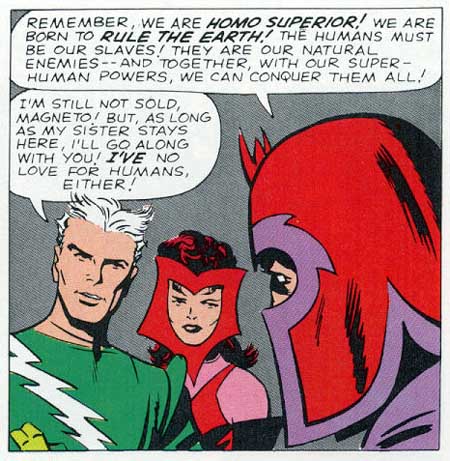
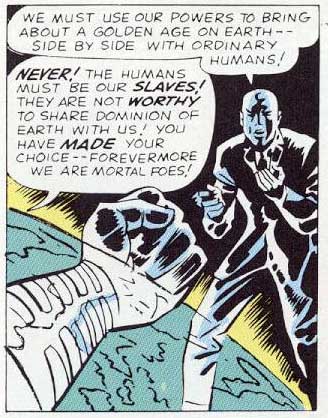
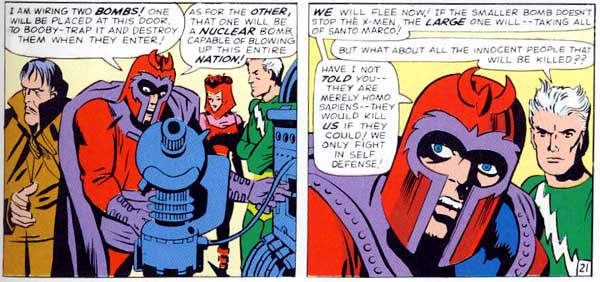
|
| Back to Top |
profile
| search
| www
e-mail
|
| |
Gerry Turnbull
Byrne Robotics Member

Joined: 16 April 2004
Location: Scotland
Posts: 8766
|
| Posted: 12 December 2007 at 6:43pm | IP Logged | 6
|
|
|
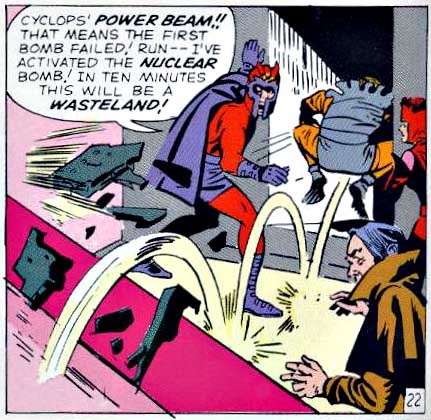
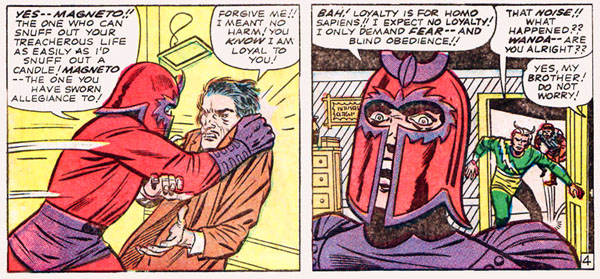
|
| Back to Top |
profile
| search
| www
e-mail
|
| |
Gerry Turnbull
Byrne Robotics Member

Joined: 16 April 2004
Location: Scotland
Posts: 8766
|
| Posted: 12 December 2007 at 6:44pm | IP Logged | 7
|
|
|
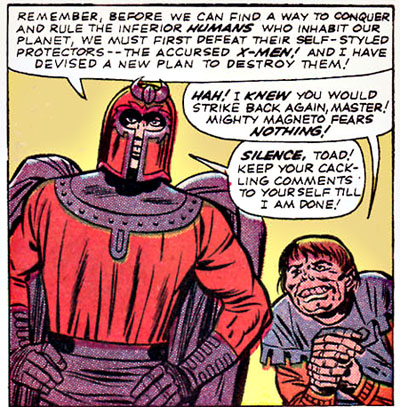
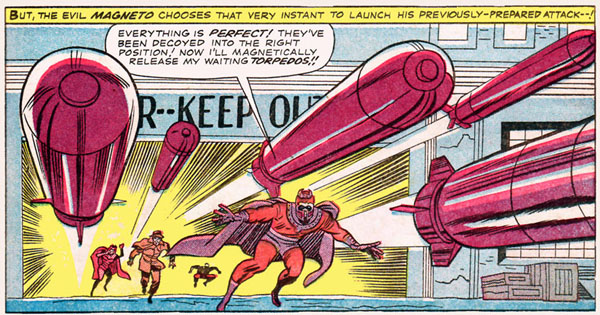
|
| Back to Top |
profile
| search
| www
e-mail
|
| |
Gerry Turnbull
Byrne Robotics Member

Joined: 16 April 2004
Location: Scotland
Posts: 8766
|
| Posted: 12 December 2007 at 6:50pm | IP Logged | 8
|
|
|
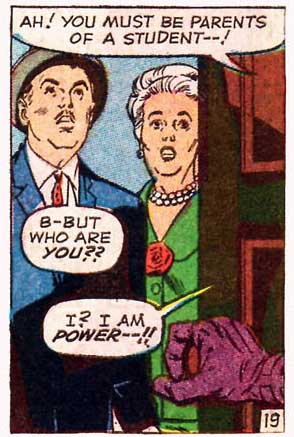
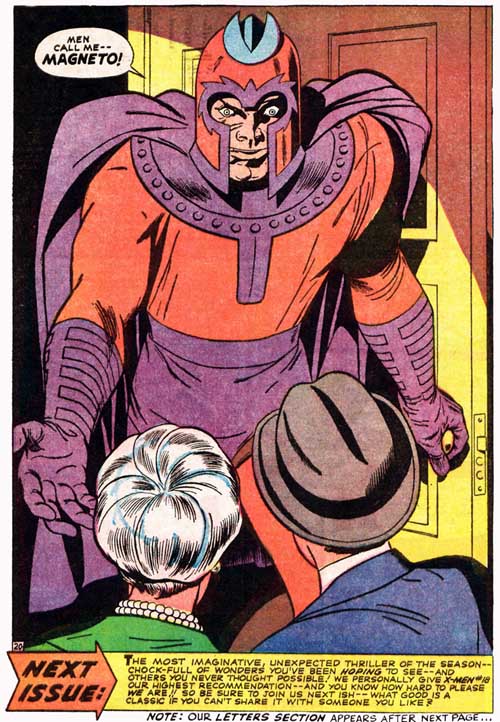
|
| Back to Top |
profile
| search
| www
e-mail
|
| |
Gerry Turnbull
Byrne Robotics Member

Joined: 16 April 2004
Location: Scotland
Posts: 8766
|
| Posted: 12 December 2007 at 6:54pm | IP Logged | 9
|
|
|
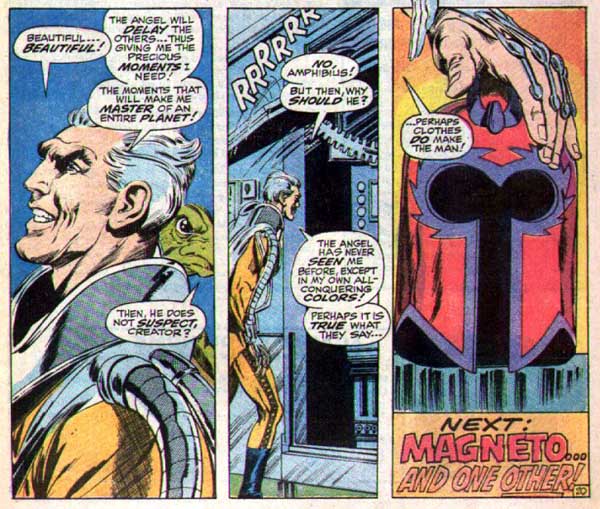
|
| Back to Top |
profile
| search
| www
e-mail
|
| |
Sean Blythe
Byrne Robotics Member

Joined: 13 July 2006
Location: United States
Posts: 342
|
| Posted: 12 December 2007 at 7:01pm | IP Logged | 10
|
|
|
this is the way i think of Magneto
I respect your opinion, Gerry, and I liked those stories too. But I guess I
don't buy into some of the more fundamentalist (meant non-religiously,
of course) views of any art form. I mean, here you have this amazing
medium -- characters and stories that carry forward through the
decades, interpreted in prose and images by hundreds of different writers
and artists (in a way, a story telling form unparalleled in modern fiction) -
- and you want everything to be the same as it was in panel one? Look, I
think Stan and Jack were two of the most creative men to come out of
20th century America, and yes, I think they got it right a lot of the time.
But comics are made by people, and people are always going want to do
the different thing, the new thing, the more complex thing. That's just
the way it is. Some are more talented than others, sure, and I'd even go
so far as to say that most of the change hasn't been for the better. But I'm
willing to deal with the screw ups if the successes are on par with Miller's
Dark Knight and O'Neil and Adams' GL/GA.
Every time someone on this forum (not picking on JBF -- it's just the only
comics-related one I read) says that so and so "ruined" a character, I
think of Stephen King responding to the question of whether the movies
have ruined his novels. He turned around, looked at the copies of his
books lining his shelves and said "Nope. They're still right there."
|
| Back to Top |
profile
| search
|
| |
Sean Blythe
Byrne Robotics Member

Joined: 13 July 2006
Location: United States
Posts: 342
|
| Posted: 12 December 2007 at 7:06pm | IP Logged | 11
|
|
|
P.S. That "Next Issue" caption in the page above is hilarious! "Next issue:
Stan's not done with the dialogue yet and Jack's messing around with the
order of the panels, but we're sure it's gonna work out!"
edit: That's not Jack, is it. Damn. Whatever.
edit 2: Or Stan. See above re: whatever.
Edited by Sean Blythe on 12 December 2007 at 7:11pm
|
| Back to Top |
profile
| search
|
| |
John Byrne

Grumpy Old Guy
Joined: 11 May 2005
Posts: 135449
|
| Posted: 12 December 2007 at 7:17pm | IP Logged | 12
|
|
|
But comics are made by people, and people are always going want to do
the different thing, the new thing, the more complex thing.
••
For around thirty years or so, the American superhero thrived as a form
intended for younger readers, produced by writers, artists and editors
who understood that what they might "want to do" must always take a
subordinate place to what had been shown to best serve the characters
and the audience. And audience which was expected to turn over roughly
every five years, so there was no real chance that the tried-and-true
methods and approaches would grow stale.
Then, in the Sixties and increasing from there, the people who produced
the comics became more and more the people who had been reading the
comics, and who, a generation earlier, would have been the ones who
moved on after five years. Now, instead of moving on, they moved in.
And they brought with them the idea that there must be "change" and
"growth" lest the characters grow "stale".
Is it just a coincidence that this influx, and this change of attitude,
corresponded so precisely with the beginnings of the most serious
decline in sales? Is it just a coincidence that this shift into producing
stories that did not hew to the proven pathways saw a drop in new
readership, and a turn toward these mass market periodicals becoming
more and more niche products -- fanzines?
They're still right there? Yes. The old comics are, indeed, still right there.
What's not there? A steady influx of new blood, new readers,
young readers. The ones who used to keep this business healthy
and thriving, not coughing along on life-support.
|
| Back to Top |
profile
| search
|
| |





